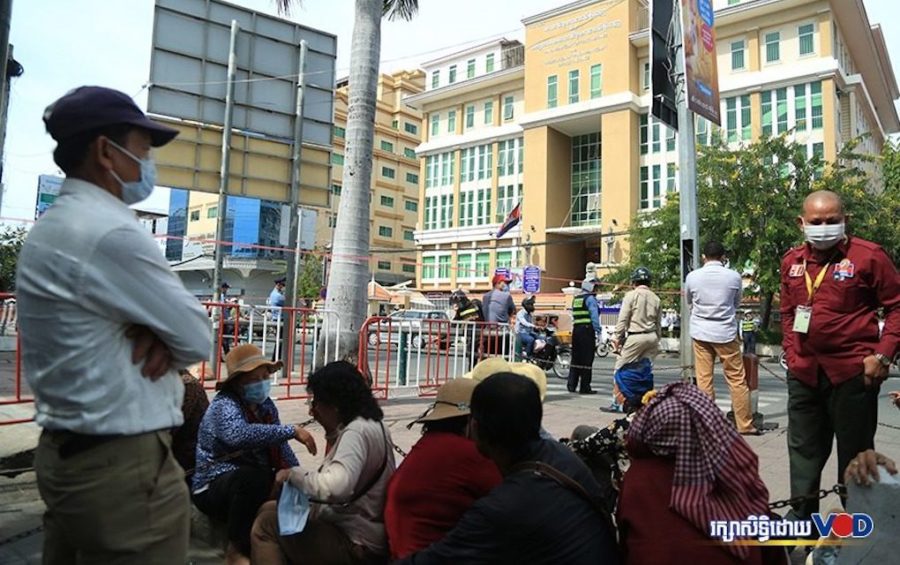Two opposition supporters on Thursday defended themselves in court against their alleged backing of Sam Rainsy’s call to rally troops around his attempted return to the country in 2019.
The Phnom Penh Municipal Court continued its mass trial against former members of the dissolved opposition CNRP, with a court clerk reading out about 60 defendants’ names for attendance. Eleven were present, including two defendants currently in detention.
During the three-hour trial, judges and prosecutors spent most of their time questioning the two jailed defendants, Kak Komphear, 55, and Heng Chan Sothy, 59, over charges of plotting and incitement.
Presiding Judge Ros Piseth presented the main facts of the alleged crimes: meetings and electronic messages about organizing CNRP co-founder Rainsy’s return, and quotes from and descriptions of top party officials’ media interviews as well as Facebook posts.
In one recording, Rainsy appealed to soldiers to rise up against Prime Minister Hun Sen, saying he was not returning just to be arrested like his party co-founder Kem Sokha, or to be killed like political analyst Kem Ley, but to arrest Hun Sen.
Ley was shot dead in Phnom Penh in 2016.
In an interview with French media, CNRP vice president Eng Chhai Eang urged people to rise up against Hun Sen and drive him out. Former lawmaker Long Ry spoke in another interview about mobilizing supporters in Thailand, South Korea and Japan to join Rainsy on his return.
Komphear, the first defendant to be called up to give testimony, denied involvement in the presented activities or even seeing the messages from party leaders.
Judges and prosecutors asked about his political background, whether he knew of Facebook and a group chat called Meato Phum Nivath — “return to the homeland” — and whether he had been in contact with party leaders or received any money from them.
Deputy prosecutor Seng Heang asked: “Sam Rainy appealed to soldiers to stop following orders. Did you know that?”
“I only knew of his [intended] return on November 9,” Komphear said.
He had seen some news about Rainsy, but it was “just for my own knowledge, and waiting to see what would happen, like other people,” he said.
Meetings with former party colleagues were just social encounters over coffee, he added.
He didn’t really understand what the crimes of plotting and incitement were about, he said. He thought crimes were about actions like illegal logging, filling up lakes and gathering forces against the country. “We didn’t do any of that, but were charged with plotting. I wonder about this,” he said.
The second defendant, Chan Sothy, told the court he had heard the leaders’ messages but he had done nothing to gather supporters.
“I just listened and expressed my concerns as the law allows,” Chan Sothy said. “I had the intention to receive him, but had no intention to do anything against the law.”
However, deputy prosecutor Heang asked the court clerk to read out Chan Sothy’s previous testimony that he had received an order from Chhai Eang, the CNRP vice president, in October 2019 to gather people for Rainsy’s return.
Chan Sothy admitted that he had received the message and shared it publicly. But he had not shared any comments that insulted the king or incited people to rise up against the government, he said.
“I don’t support the incitement of soldiers,” Chan Sothy said.
The mass trials have been condemned by human rights groups, with New York-based Human Rights Watch issuing a statement criticizing “new, bogus charges against over 100 CNRP members.”
“Any pretense of a free and fair trial really went out the window the minute these mass proceedings were announced,” it said.
The CNRP, formerly the main opposition party in the country, was dissolved in 2017 following co-founder Sokha’s arrest for alleged treason. Supporters have faced widespread legal action against them since, with tensions ramping up when Rainsy, who lives in exile in France, announced his intention to return to Cambodia on November 9, 2019. Dozens of supporters were arrested in the days leading up to the date.
Rainsy did not make it onto his flight from Paris.
The first hearing into the current mass trial was held in November, when more than 130 names were read out and four separated cases were combined into two, with hearings postponed for later dates.
Rainsy and other top party leaders living abroad are also among the defendants. Some have appealed to the government to allow them to return to the country to attend the trials.
Speaking outside the court, Cambodian Center for Human Rights director Chak Sopheap said she had never seen such serious charges brought against others, such as alleged illegal loggers.
“I think the charge of plotting is too serious,” she said, suggesting it was political affiliations that got many of the defendants in trouble.
The trial will continue on January 28, the court announced.












